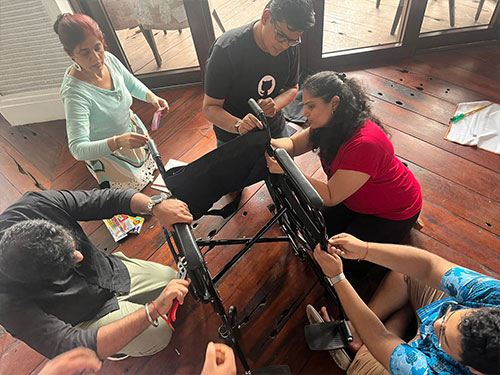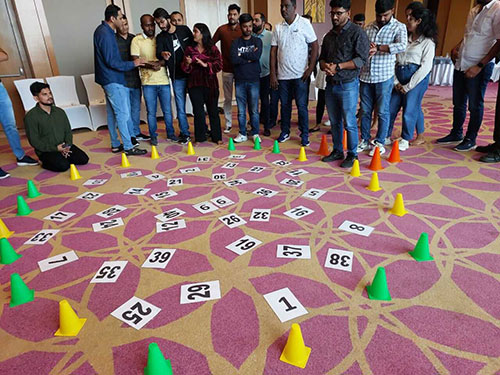In today’s fast-paced work environment, high-performing teams are essential for achieving organizational success. But what truly sets these teams apart from the rest? The answer lies in one crucial element: trust. At The Team Ex, we firmly believe that building trust is the cornerstone of effective teamwork. In this blog, we’ll explore why trust is vital to team dynamics and provide actionable strategies for cultivating it within your team.
Why Trust Matters
Trust is more than just a feel-good concept; it directly impacts team performance, collaboration, and innovation. Here are some key reasons why trust is crucial for high-performing teams:
1. Enhanced Collaboration
Trust fosters open communication, allowing team members to share ideas without fear of judgment. When team members feel safe to express their thoughts, they are more likely to contribute creatively, leading to better problem-solving and innovative solutions. A collaborative environment nurtures diverse perspectives, which can be a game-changer in achieving project goals.
2. Increased Accountability
When team members trust one another, they are more likely to take ownership of their tasks and responsibilities. This heightened sense of accountability drives individuals to meet deadlines and exceed expectations. In a trusting atmosphere, everyone knows that their contributions are valued, leading to a collective commitment to success.
3. Stronger Relationships
Trust builds robust interpersonal relationships, which enhance team morale and reduce conflict. Strong relationships create a supportive network where team members can lean on one another during challenging times. Ultimately, happy teams are productive teams, and trust plays a significant role in fostering job satisfaction.
4. Improved Resilience
Trusting teams are better equipped to handle challenges and setbacks. When difficulties arise, team members who trust each other are more likely to collaborate effectively to find solutions. They can pivot quickly, support one another through adversity, and bounce back stronger than before.
How to Build Trust in Your Team
1. Foster Open Communication
Encouraging open communication is the first step in building trust. Create a culture where team members feel comfortable expressing their thoughts and concerns. Regular check-ins, feedback sessions, and open-door policies can help create a safe space for dialogue. Use tools like anonymous surveys to gather honest feedback and address issues transparently.
2. Set Clear Expectations
Clearly defined roles and responsibilities help team members understand what is expected of them. This clarity builds trust, as everyone knows their contributions matter. Create a shared document outlining team goals, individual roles, and deadlines. This roadmap not only aligns expectations but also enhances accountability.
3. Promote Team Bonding
Engaging in team-building activities that allow members to connect on a personal level can significantly boost trust. Consider organizing retreats, workshops, or fun social events that encourage team bonding. Shared experiences help break down barriers, promote empathy, and strengthen relationships.
4. Lead by Example
As a leader, your actions set the tone for the entire team. Model the behavior you want to see in others. Demonstrate trustworthiness through transparency and integrity. When team members observe you being honest, reliable, and accountable, they are more likely to mirror those behaviors.
5. Acknowledge Achievements
Celebrating both individual and team successes reinforces a culture of trust and appreciation. Regularly recognize contributions, whether through shout-outs in meetings, a dedicated recognition platform, or team celebrations. Acknowledgment not only boosts morale but also reinforces the idea that everyone’s efforts are valued.
6. Encourage Vulnerability
Creating an environment where team members can be vulnerable is essential for building trust. Encourage sharing not just successes but also challenges and failures. This openness fosters empathy and understanding, allowing team members to support each other more effectively.
7. Provide Growth Opportunities
Investing in your team’s professional development fosters trust and loyalty. When team members see that you are committed to their growth, they are more likely to reciprocate with commitment to the team’s success. Offer training, mentorship, and opportunities for skill development to show your investment in their future.
Conclusion
Building trust is an ongoing process that requires commitment and effort from everyone involved. At The Team Ex, we understand the critical role trust plays in creating high-performing teams. By fostering open communication, setting clear expectations, promoting team bonding, and celebrating successes, you can cultivate a trustworthy environment that propels your team to new heights.
Are you ready to take your team to the next level? Start building trust today and watch your team thrive!
For more tips and resources on team building, visit The Team Ex. Let’s work together to create a culture of trust and collaboration that drives success!
Get latest insights into our new exciting activities.



.jpg)


.jpg)










.jpg)






 (1).jpg)







